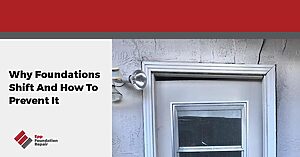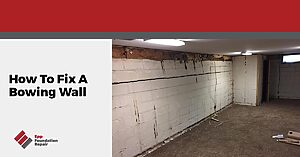
Cracks along a brick wall are not always a cause for immediate alarm, but it is imperative to distinguish structural from nonstructural cracks. Structural cracks require quick repair because they are signs of foundation damage that threaten the structural integrity of your home. Nonstructural cracks are usually just cosmetic issues, but they should still be monitored and repaired to prevent future damage.
You have come to the right place if you have a crack in your brick wall. In this article, find out why brick walls crack in the Midwest, the story your cracked brick is telling you, and how to repair your cracked brick wall.
What Causes Brick Walls to Crack?
Brick walls crack for many reasons, but here are the top seven:
Differential Settlement
Differential settlement is when part of your foundation sinks faster than the rest. This happens because of:
- Poor site preparation
- Expansive soil
- Poor water drainage
- Erosion
- Earthquakes
- Excavation too close to the foundation
Differential settlement is grave because it threatens the structural integrity of your home. As your home unevenly settles, it forces cracks along your brick wall.

Hydrostatic Pressure
When water builds up in the soil surrounding your foundation, it exerts immense pressure on your home. If you have a poor drainage system, the water will continue to build pressure in the soil and cause your foundation and, eventually, your brick wall to crack and bow.
Overloading
Too much weight or pressure on your brick walls can cause them to crack. Overloading usually happens because of hydrostatic pressure or a home addition gone awry. In rare cases, overloading may occur because of poor home design.
Thermal Expansion
Bricks and mortar are porous, meaning they can absorb moisture. Over time, as the weather and seasons change, the bricks and mortar go through periods of expansion and contraction as they absorb and release water. This constant movement leads to cracking.
Water Damage
If your brick wall is constantly exposed to water damage, perhaps because of a leak behind your brick wall, clogged gutters, or preexisting cracks, the bricks and mortar are weakened and are subject to cracking.
Age and Deterioration
Older brick homes are naturally subject to cracking because of the brick and mortar’s inevitable wear and tear and deterioration. Deterioration is especially evident in homes that are poorly maintained.
Invasive Plants
Tree roots can extend toward your home and cause cracks in your foundation and walls. They may also cause the soil to shift, contributing to differential settlement as they grow. Another type of problematic plant is invasive vines. While vines growing along the side of your home may look visually appealing, their root systems can create cracks in the wall and allow moisture to penetrate, leading to further deterioration.
What Are the Different Types of Brick Cracks?
Three main types of brick cracks are horizontal, vertical, and diagonal or stairstep. Each one provides a clue about the underlying issues your home is facing.
Horizontal Cracks
Horizontal cracks may signal one of the following issues:
- Improper curing of the mortar
- Lack of expansion joints
- Rusting metal lintels
- Foundation settlement
While all of these issues should be addressed to prevent further damage, issues related to differential settlement should be addressed promptly. If the horizontal crack is due to a foundation issue, you may notice that one side of the crack is wider, the crack is along the lower half of the wall, or the wall is bowed.

Vertical Crack
Vertical cracks usually occur because of:
- Thermal expansion
- Poor workmanship
- Overloading
- Foundation settlement
If the crack is because of overloading of the wall or foundation settlement, contact a repair specialist right away.
Diagonal or Stairtep Cracks
Diagonal and stairstep cracks are almost always due to foundation issues. If you start to see any sign of this type of crack, schedule an appointment with a professional immediately.
How Do I Know If My Cracked Bricks Are a Sign of Foundation Issues?
Sometimes, it may be difficult to tell if the cracks in your brick are due to foundation damage and warrant immediate repair. Not to worry, because there are many other telltale signs of foundation issues that, if you also spot them around your home, you know it is time to call a foundation repair professional.
- Cracks in walls, floors, and ceilings – If your foundation is settling unevenly, you will see cracks running up or across your walls, floors, or ceiling. Check your basement or the first story of your home for early signs of damage.
- Gaps between walls and the floor or ceiling – Differential settlement causes the walls to pull away from the floors or ceiling. If you notice any gaps, monitor them closely to see if they grow over time.
- Sloping floor – If you can put a marble on the floor and it starts rolling, you have a sloping floor.
- Sticking windows and doors – When a home settles unevenly, it warps the house’s framing. The warped framing causes the doors and windows to start sticking in the affected areas and become more difficult to open.
- Leaning or cracked chimney – Check your chimney for cracks or separation from the home.
- Leaning or cracked porches and steps – If your porches start pulling away from your home or developing large cracks, you have foundation problems.
- Bowed walls – Foundation damage may cause the walls of your home to bow inward. If you see that happening in your home, call a professional promptly.

How Do You Repair Cracked Bricks?
Repair methods for cracked brick walls vary depending on the reason for the damage. If the crack is a minor cosmetic problem, all that may be necessary is replacing the damaged bricks and applying new mortar. However, if there are large cracks or bowed or sagging walls, the whole wall may need replacing. If that is the case with your home, it is important to contact a foundation repair company first to determine if the damage was due to a foundation problem and, if so, to correct it before any new mason work is done.
A foundation repair expert will carefully investigate your home’s foundation to determine any damage and what caused it. If your home has settled unevenly, the expert will likely recommend foundation underpinning to support and permanently raise the foundation. It is a minimally invasive and immediate repair solution. If you have bowed and cracked walls, the expert may recommend wall anchors and an epoxy injection. Lastly, the expert will recommend ways to prevent future foundation damage, such as installing a proper drainage system.
When Should I Call a Professional about My Cracked Bricks?
While hairline cracks in a few bricks are usually nothing to worry about, it is important to call a professional right away if:
- You have medium to large-sized cracks
- The cracks are widening or extending over time
- The crack extends horizontally, vertically, and especially diagonally
- You notice other signs of foundation damage

Failing to act promptly will only result in further, more costly damage. Have peace of mind knowing the cause of your cracked brick wall by scheduling an appointment with Epp Foundation Repair today. We will thoroughly assess your home’s structural integrity and offer the most reliable solutions for your family. Contact us today if you have a cracked brick wall in Nebraska, Iowa, Kansas, and Missouri.







